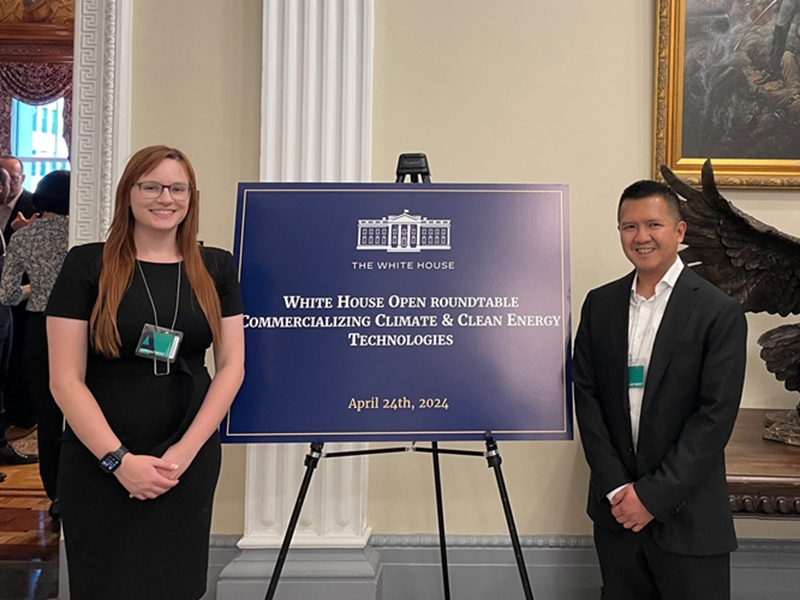
After cultivating huge crops of peanuts or rice, many parts of the plant are left behind in the form of peanut or rice hulls. Farmers may see mounds of agricultural waste, but Nhiem Cao and Angel Treat see the beginnings of bio-based jet fuel!
Cao and Treat, two students in the Master of Science in Product Innovation program at the Sam M. Walton College of Business, want to make the world "cleaner, greener, greater" through their jet fuel startup company ProPika.
"We turn agricultural waste into jet fuel by using a catalytic membrane reactor," said Cao, ProPika founder and CEO. "Our technology combines a catalyst and membrane. We don't actually go all the way to making jet fuel. What we do is make the pre-cursor for jet fuel, which traditional refiners can use for jet fuel or other fuel production."
The duo started ProPika through the technology and advice from professors at the U of A.
"We officially launched ProPika on Sept. 20, 2023. We started it as an Arkansas based LLC," said Treat, the chief technology officer. "We found the technology by working with the inventors of the technology, Dr. Ranil Wickramasinghe and Dr. Xianghong Qian. We were helping them with a grant proposal."
ProPika's mission is to leverage technology to create a cleaner, greener and greater future for the planet. They hope to make the biggest impact they can with the resources afforded to them. To assist with that mission, Cao and Treat enrolled in the Master of Science in Product Innovation to learn how to best manage and market their product. The program outlines the steps needed to create a successful business and implementation plan. It incorporates customer research, prototyping, marketing, supply chain, sustainability issues and more.
Cao and Treat earned their undergraduate degrees from the U of A, and those degrees help them understand the technology of the bio-waste transformation. Cao earned a bachelor's in chemical engineering. Treat earned a bachelor's in biomedical engineering.
Since the team was familiar with the U of A and the Northwest Arkansas region, pursuing a graduate degree at Walton College was an easy decision.
"The reputation and relationships within the Walton College made it an easy choice," Treat said. "The MSPI program was really attractive because it was a brand-new program. It allowed us to put our own fingerprint on it. It was an opportunity to not just be a part of a program, but to help build it."
The Master of Science in Product Innovation graduate degree will assist them in understanding product development and product management - the business side of ProPika. One goal is to raise the funding needed to support the company. The team is well on its way to becoming recognized by venture capitalists through business competitions. They placed fourth at Heartland Challenge, first at Arkansas Governor's Cup and second at the Energy Tech University Prize competition.
"The Heartland Challenge is important for Northwest Arkansas. It draws in competitors and judges from all over the country. The exposure gets us in front potential investors," Cao said. "The same is true for Governor's Cup. The Energy Tech University Prize is important because it gives us a platform to reach out to government agencies who can provide non-dilutive funding through grants. All these competitions also provide some validation for our technology and business."
Most recently, ProPika participated in the international Bangkok Business Challenge in June. The challenge, hosted by at the Sasin School of Management, drew 276 student teams from 62 universities on five continents. ProPika was the only U.S. team to make the final round, and they took the grand prize!
"The MSPI program provides a great perspective. It's a brand-new program that focuses on design and commercialization," Cao said. "Aside from the class material, the experience outside the classroom allows the application of those skills. The networking opportunities are also invaluable."
Topics
Contacts
Lori McLemore, assistant director of marketing and recruitment
Graduate School of Business
479-575-5021,